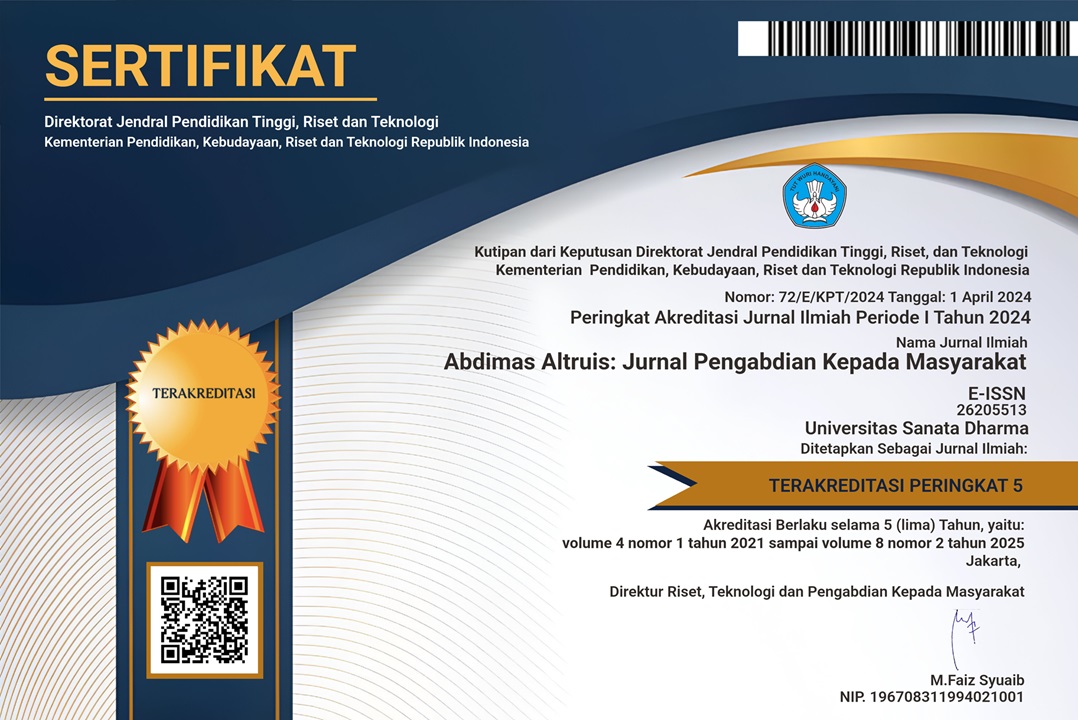REKAYASA LEMBAGA EKONOMI KREATIF KETAHANAN PANGAN LOKAL MASYARAKAT WALANTAKA DALAM NILAI KEARIFAN LOKAL
(1)
(2) Universitas Sultan Ageng Tirtayasa
(*) Corresponding Author
Abstract
In Walantaka, there is one of the centers of creative economy of traditional snack such as ‘bugis, cucur, and leupeut’ that is traditionally run and sold in the storefront. Uniformity of business and cake that get quickly stale often causes losses; and the comunity’s economy becomes minimal. ‘Hajat’ as a distinctive traditon of mutual cooperation in material an immaterial relying on trust and networking with the need for patriees as an invitation, is precisely the business oppurtunity cultivated by newcomers. The success of migrants is due to modern business methods and management by relying on networks and trust. The program aims to offer the public a choice of types, methods and effective bisiness management. Mix method is used with material through digital literacy, lectures, discussions, and practice with 4 meetings. Participants’ feedback is to write the type of cake to be made, the ingredients needed, made at home, evaluated at the next meeting, until the product is ready for production and marketed by partners. The result is that 42 of those present at the fisrt meeting continued to shrink dramatically at the next meeting. In the third meeting, the team must visit directly to the homes of potential participant. The container that was expected to run into a pioneering organization for the creative economy center of the community was not successful. Communities with low economies focuses on meeting the needs quickly, and clearly.
Keywords
Full Text:
PDF (Bahasa Indonesia)References
Albert Arron. 2018. Superfood Asli Indonesia yang Tak Kalah super. Artikel elektronik 14 (12). Diunduh 16 Juli 2019 dari https://www.timesindonesia.co.id/read/news/192527/superfood-asli-indonesia-yang-tak- kalah-super.
Khaeron,Arman. 2017 . Pangan Lokal untuk Diversifikasi Pangan Berkelanjutan. Artikel elektronik, 16 (09). Diunduh 7 Maret 2019 dari http://new.litbang.pertanian.go.id/info- aktual/3060/
Munaf, triawan. 2016. Badan ekonomi kreatif tanda tangan MoU kerjasama dengan British Council Indonesia. Artikel elektronik 04(12). Diakses 22 Juni 2019 dari https://cadaazz.com/2016/04/12/
Nahdliyah, Ilma Filyatun. 2017. Pengembangana Kreatifitas Ekonomi Masyarakat Melalui Potensi Lokal. Junal elektronik 16(06). Diakses 20 Agustus dari http://digilib.uin- suka.ac.id/
Prawirokusumo, Soeharto. (2001). Ekonomi Rakyat: Konsep Kebijakan dan Strategi (Edisi 1). Yogyakarta :BPFE,2001.
Puteri, ddk. 2019. Peningkatan Keterampilan Pembuatan Dan Pemasaran Kecap Biji Nang- ka: Alternatif Bahan Pendamping Makanan Di Keputih Surabaya. ABDIMAS ALTRU- IS Jurnal Pengadian Kepada Masyarakat Vol. 2, No. 1, April 2019 45 diakses tgl 4 Sep- tember 2019 dari https://e-journal.usd.ac.id/index.php/ABDIMAS/article/view/2128/1627
Soetalaksana, Andhika. 2019. Tingkatkan Literasi Industri Digital, kreatif dan hiburan. Artikel elektronik, 01(03). Diakses pada tgl 7 Maret 2019 dari https://www.jpnn.com/news/tingkatkan-literasi-industri-digital-kreatif-dan- hiburanPramono, Media Indonesia (https://mediaindonesia.com/read/detail/39961-pacu-industri-kreatif-bekraf- dorong-kerja-sama-dengan-inggris)
DOI: https://doi.org/10.24071/aa.v3i1.2951
Refbacks
- There are currently no refbacks.
Abdimas Altruis: Jurnal Pengabdian Kepada Masyarakat telah terakreditasi nasional Sinta 5 oleh Kementerian Pendidikan, Kebudayaan, Riset dan Teknologi Republik Indonesia berdasarkan surat keputusan No.Surat Keputusan 0547/E5 /DT.05.00/2024. Masa berlaku 5 tahun : Vol 4 No 1 Tahun 2021 s/d Vol 8 No 2 Tahun 2025.

Terindeks oleh:
This work is licensed under CC BY-SA.
Creative Commons Attribution-ShareAlike 4.0 International License.
Abdimas Altruis: Jurnal Pengabdian Kepada Masyarakat diterbitkan dua kali setahun, yakni pada April dan Oktober,
oleh Lembaga Penelitian dan Pengabdian Kepada Masyarakat, Universitas Sanata Dharma, Yogyakarta, Indonesia.






















